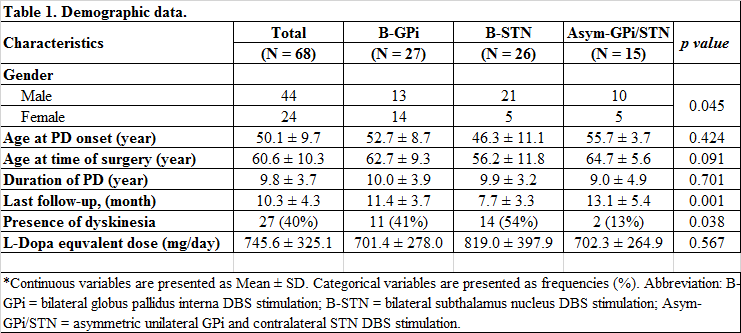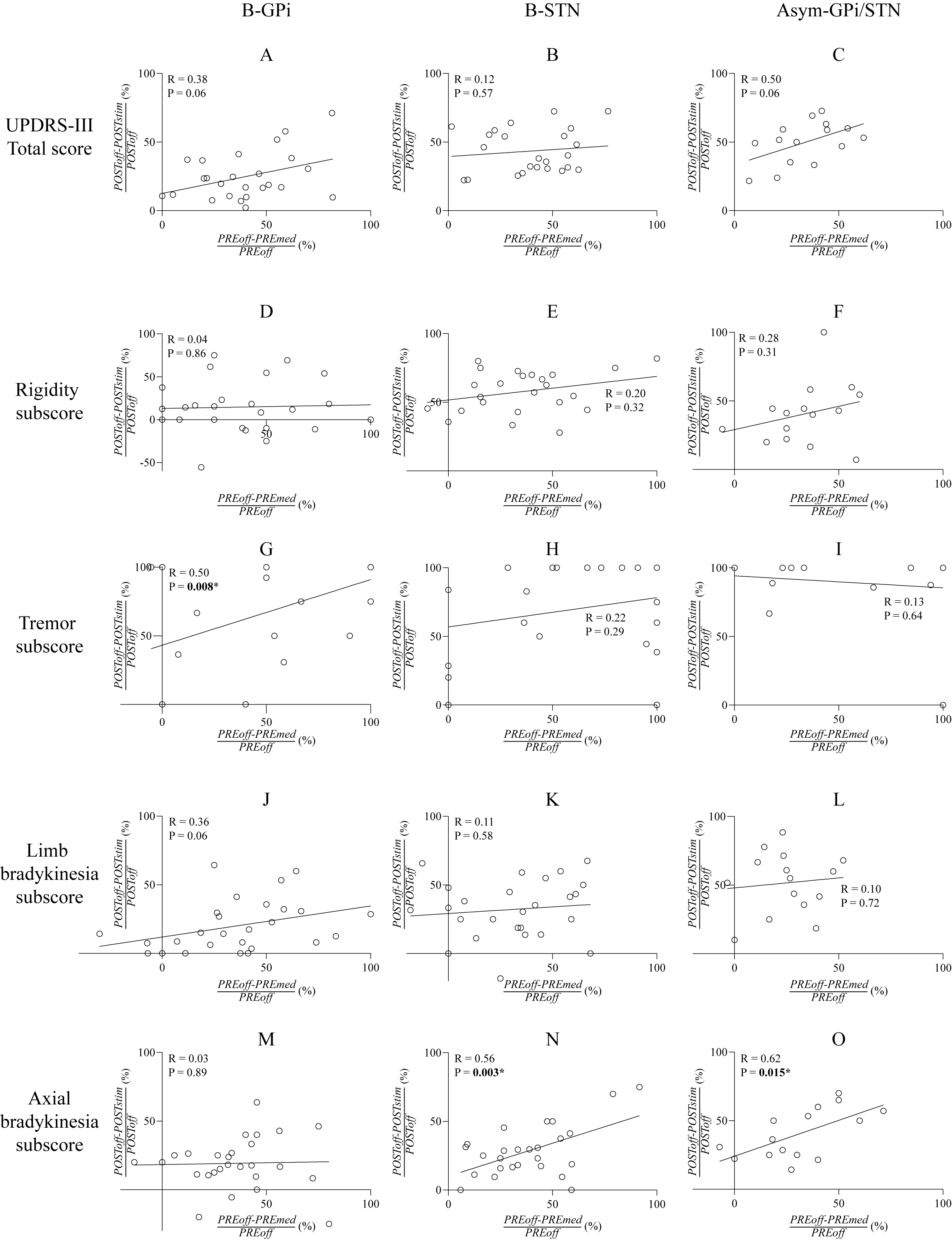Category: Surgical Therapy: Parkinson's Disease
Objective: To investigate the correlation between pre-operative response to levodopa following levodopa challenge test and the efficacy of deep brain stimulation (DBS) on motor functions for Parkinson’s disease (PD).
Background: Pre-operative levodopa responsiveness has been widely accepted to be able to predict the effects of DBS after surgery [1,2]. Several studies, however, reported the controversial results [3,4]. Moreover, most of the literature only recruited patients undergoing bilateral subthalamic nucleus (STN) DBS. Correlation between the response to levodopa and to globus pallidus interna (GPi) DBS instead, was less studied. Besides symmetric bilateral GPi or STN electrode implantation, our center has recently reported preliminary results of asymmetric unilateral GPi and contralateral STN DBS in 8 PD patients [5].
Method: We retrospectively reviewed data of 68 PD patients undergoing DBS surgery, among whom 27 were implanted with bilateral GPi-DBS (B-GPi), 26 with bilateral STN-DBS (B-STN), and 15 with asymmetric unilateral GPi and contralateral STN DBS (Asym-GPi/STN). Pre-operatively, the Unified Parkinson Disease Rating Scale Motor Part was assessed in both off and on dopaminergic medication conditions (PREoff and PREmed, respectively). Similarly, UPDRS-III was assessed post-operatively in off medication/off stimulation and off medication/on stimulation conditions (POSToff and POSTstim, respectively) at each follow-up. Particularly, rigidity, tremor, limb bradykinesia, and axial bradykinesia scores were individually analyzed.
Results: Demographic data were listed in Table 1. The linear regression analysis showed that there was no significant correlation between pre-operative levodopa responsiveness and post-operative DBS responsiveness on the total score of UPDRS-III in all three groups (Figure 1). With respect to UPDRS-III subscores, a significant positive correlation between response to levodopa and response to B-GPi was found regarding the rigidity score (r = 0.50, p = 0.008). Moreover, responses to B-STN and to Asym-GPi/STN were respectively positively correlated with levodopa responsiveness on axial bradykinesia score (r = 0.56 and 0.62; p = 0.003 and 0.015, respectively).
Conclusion: Levodopa challenge test seems to have limited value for prediction of the effect magnitude of DBS on motor functions in PD.
References: [1] P.D. Charles, N. Van Blercom, P. Krack, S.L. Lee, J. Xie, G. Besson, A.-L. Benabid, P. Pollak, Predictors of effective bilateral subthalamic nucleus stimulation for PD., Neurology. 59 (2002) 932–934. [2] M.L. Welter, J.L. Houeto, S. Tezenas du Montcel, V. Mesnage, A.M. Bonnet, B. Pillon, I. Arnulf, B. Pidoux, D. Dormont, P. Cornu, Y. Agid, Clinical predictive factors of subthalamic stimulation in Parkinson’s disease, Brain. 125 (2002) 575–583. [3] P. Piboolnurak, A.E. Lang, A.M. Lozano, J.M. Miyasaki, J.A. Saint-Cyr, Y.-Y.W. Poon, W.D. Hutchison, J.O. Dostrovsky, E. Moro, Levodopa response in long-term bilateral subthalamic stimulation for Parkinson’s disease, Mov Disord. 22 (2007) 990–997. [4] A. Zaidel, H. Bergman, Y. Ritov, Z. Israel, Levodopa and subthalamic deep brain stimulation responses are not congruent., Mov Disord. 25 (2010) 2379–2386. [5] C. Zhang, L. Wang, L. Almeida, B. Sun, D. Li, Asymmetric Deep Brain Stimulation Electrodes for Parkinson’s Disease: A Pilot Study of Symptom-Tailored Stimulation, Neurosurgery. 66 (2019).
To cite this abstract in AMA style:
Z.Y Lin, Y-Y. Zhang, L.B Wang, C-C. Zhang, B.M Sun, D.Y Li. Levodopa Challenge Test for Prediction of Deep Brain Stimulation Efficacy on Motor Functions for Parkinson’s Disease [abstract]. Mov Disord. 2020; 35 (suppl 1). https://www.mdsabstracts.org/abstract/levodopa-challenge-test-for-prediction-of-deep-brain-stimulation-efficacy-on-motor-functions-for-parkinsons-disease/. Accessed December 13, 2025.« Back to MDS Virtual Congress 2020
MDS Abstracts - https://www.mdsabstracts.org/abstract/levodopa-challenge-test-for-prediction-of-deep-brain-stimulation-efficacy-on-motor-functions-for-parkinsons-disease/


